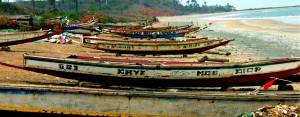
When German grocery retailer Kaufland donated €100,000 to the sole fishery co-management body in The Gambia earlier this year, it was a tangible vote of confidence for sustainable management of the fishery supported by a Coastal Resource Center’s (CRC) project in the tiny West African country. It also signaled a growing awareness and demand from western consumers for seafood products that are “eco-friendly.”
“It’s great the private sector is interested in protecting a sustainable fishery in a developing country,” said Karen Kent, senior coastal manager with the CRC, based at URI’s Graduate School of Oceanography. CRC’s USAID-funded work in The Gambia created the National Sole Fishery Co-management Committee (NASCOM), which developed out of a consultative process with actors at all levels in the artisanal sole fishery over three years. The plan for the fishery, which numbers between 500-800 artisanal boats, is unique in that part of the world. The Sole Fishery Co-Management Plan, signed in early 2012, creates a special management area for the sustainability of the sole fishery on Gambia’s Atlantic coast and grants NASCOM exclusive use rights to the fishery within the special management area.
Sole is exported to Europe or sold to the tourist industry in The Gambia and is an important foreign exchange generator for the nation. The co-management plan, which places limits on fishery access to help sustain the species, is instrumental in the process of the fishery working toward achieving the coveted Marine Stewardship Council (MSC) label, designating it a sustainable fishery. The Kaufland funds will help NASCOM to implement the plan and move closer to meeting the labeling requirements.
That eco-label adds marketability and, sometimes, a price premium. Yet, recognition from private industry also could put new demands and stress on the fishery.
Ousman Drammeh, project manager in The Gambia, said the support of Kaufland is important in a couple of ways. “On the economic front, the label signifies new markets and opportunities and better prices. On the conservation front, it means recognition that the fishermen must fish responsibly and sustainably.”
The money from Kaufland will be used to reimburse the MSC for certification-related costs, to purchase three patrol boats for enforcement, cold boxes for storing fish between catching and processing and equipment for maintaining hygiene at the landing sites and to establish a revolving loan initiative that supports efforts to adopt gear-mesh size changes as well as other alternatives.
Dawda Saine, secretary of NASCOM, sees opportunity through Kaufland’s investment to improve management of the fishery in the long-term. Measures such as altering fishing net mesh size to prevent the catch of juvenile fish and closing all fishing activity (all species and all gear types) out to one nautical mile during spawning season remain the focus of this innovative fisheries plan.
What the MSC label could mean to Gambian people’s livelihoods
- Scientific gains: a better understanding of the biology and ecology of the sole fish resources, using both the scientific and Local Ecological knowledge (LEK) to better manage the resources
- Conservation and management gains: harvesting rules, closed areas/seasons and responsible fishing practices, gear selectivity and sustainability and optimal utilization of resources
- Societal impacts: understanding the importance of collaborative resource management, collective decision-making and a unified voice to influence policies. Improved sanitation and hygiene practices.
- Economic impacts: increase market access and income generation for artisanal fishermen and related labor force, job creation and linkages with global fisheries markets and leaders


